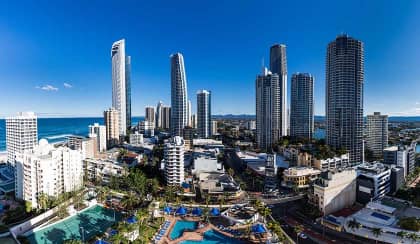Beware holiday home shopping — Why you might want to think twice
A property adviser has warned happy-go-lucky investors against buying a serviced apartment while holidaying in 2022–23.

According to Anna Porter, serviced apartments can be a high-risk investment — especially at this time of year.
The principal of Suburbanite, who is also a valuer, warned that more often than not, the promise of higher yields means higher risks — and with the popularity of serviced apartments often peaking after holiday periods, she is offering the very timely warning.
She acknowledges that summer holidays “are a great opportunity to find yourself facing a 4D model in the local shopping centre of the next big investment disguised by promises of high returns”.
She has personally seen these investments stay vacant for months, if not years, with vacancy rates trending differently in spite of the holiday-home trend that’s exploded thanks to COVID-19.
It’s all the more important of a reminder given that this holiday period will see many Australians “start to feel the pinch” following eight consecutive rate rises in 2022.
She believes it is likely there will be an increase in “lifestyle properties” — such as serviced apartments — hitting the markets, “as these are one of the first things property owners will let go of”.
Reminding holiday-makers that the structure of ownership for serviced apartments is “very different” to a typical property purchase, Ms Porter outlined how “serviced apartments must be a part of the letting pool so they cannot be rented out privately and must go into the commercial style letting pool, which occurs through the overarching lease or through the DA”.
Generally, serviced apartment leasing schemes operate very differently from traditional residential holiday letting.
“With an overarching lease, there is, for example, a 10-year lease to a company such as QUEST or ADINA, which provides a higher yield for investors, but if you wish to stay there, you must book through their service,” Ms Porter outlined.
Other times — and perhaps more commonly — it is in the DA, “which often is simply a way for the developer to utilise the tourism zoning to the discontent of local councils”.
According to the agent, when this occurs, oftentimes, smaller companies come in to run the building and its functionalities. But, when they fail, it can lead to bankruptcy of the head lessor — meaning unit owners “must still abide by the letting pool conditions and not rent the units privately or move in despite the units being unoccupied”.
According to Ms Porter, this causes investors to “play a waiting game” while potentially hundreds of units are left unoccupied.
Through her work as a valuer, Ms Porter said she has seen many instances where the owners cannot meet the financial commitments, and the mortgagees move in and take over unit by unit. This can result in significant declines in values.
“There really isn’t an easy way out when it goes bad,” she quipped.
“I have seen many properties foreclosed on by the lender and sold mortgagee in possession when the management company walks away, leaving the investors with the mess,” she went on to warn.
“My best advice is to stay well away from them in the first place.
“However, if you do have an appetite for this type of risk, then opt for a serviced apartment that has the letting pool structure in the managing agreement and NOT in the original development application.
“This will mean that if the overarching managing company goes bankrupt and walks away from the agreement, you can let out the property privately, or on a platform such as Airbnb or live in it.
“However, if the letting pool structure sits in the original DA, then it is most likely that you will not be able to do anything with the unit — not even rent it out or live there — until another serviced apartment company takes over the head lease.”

